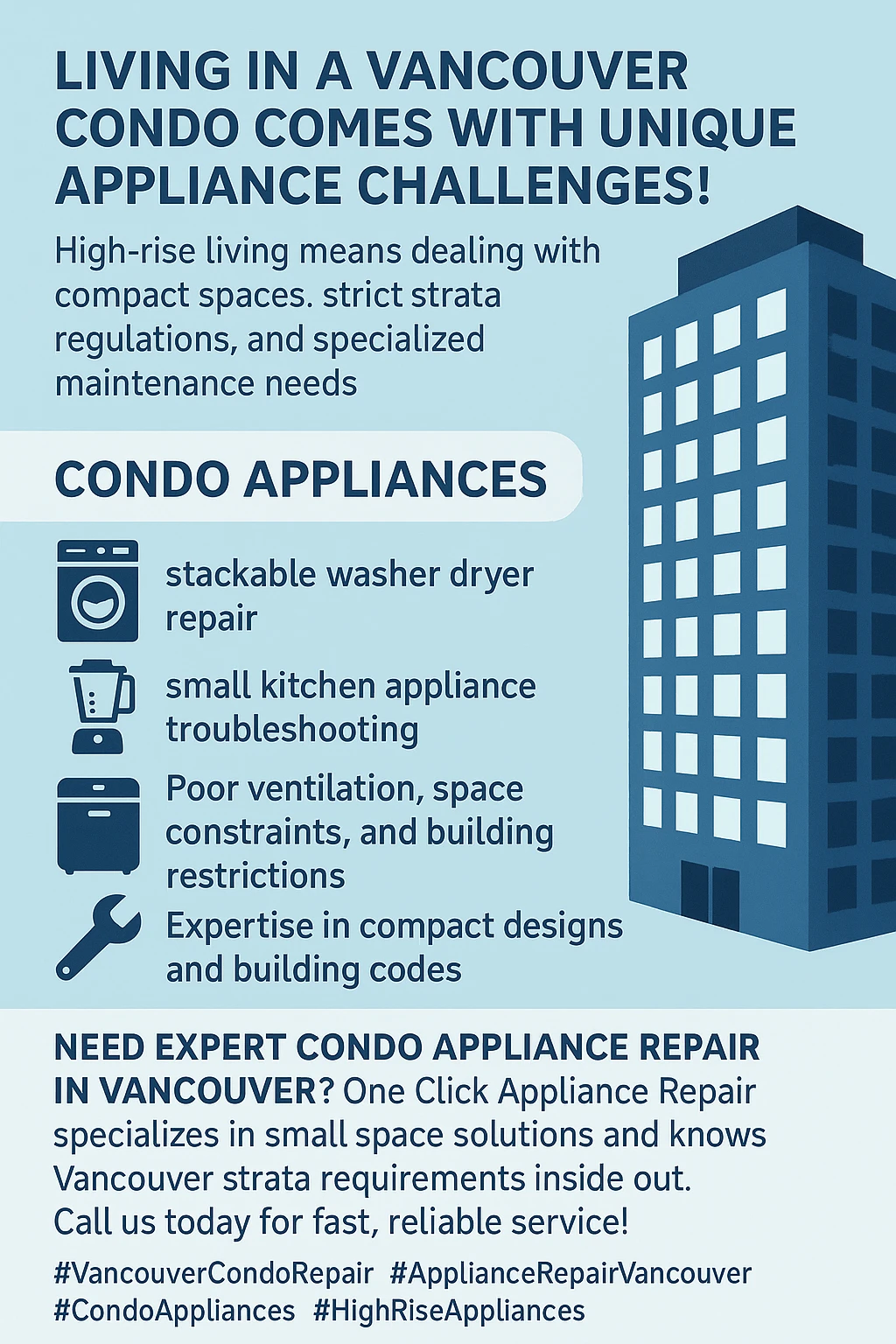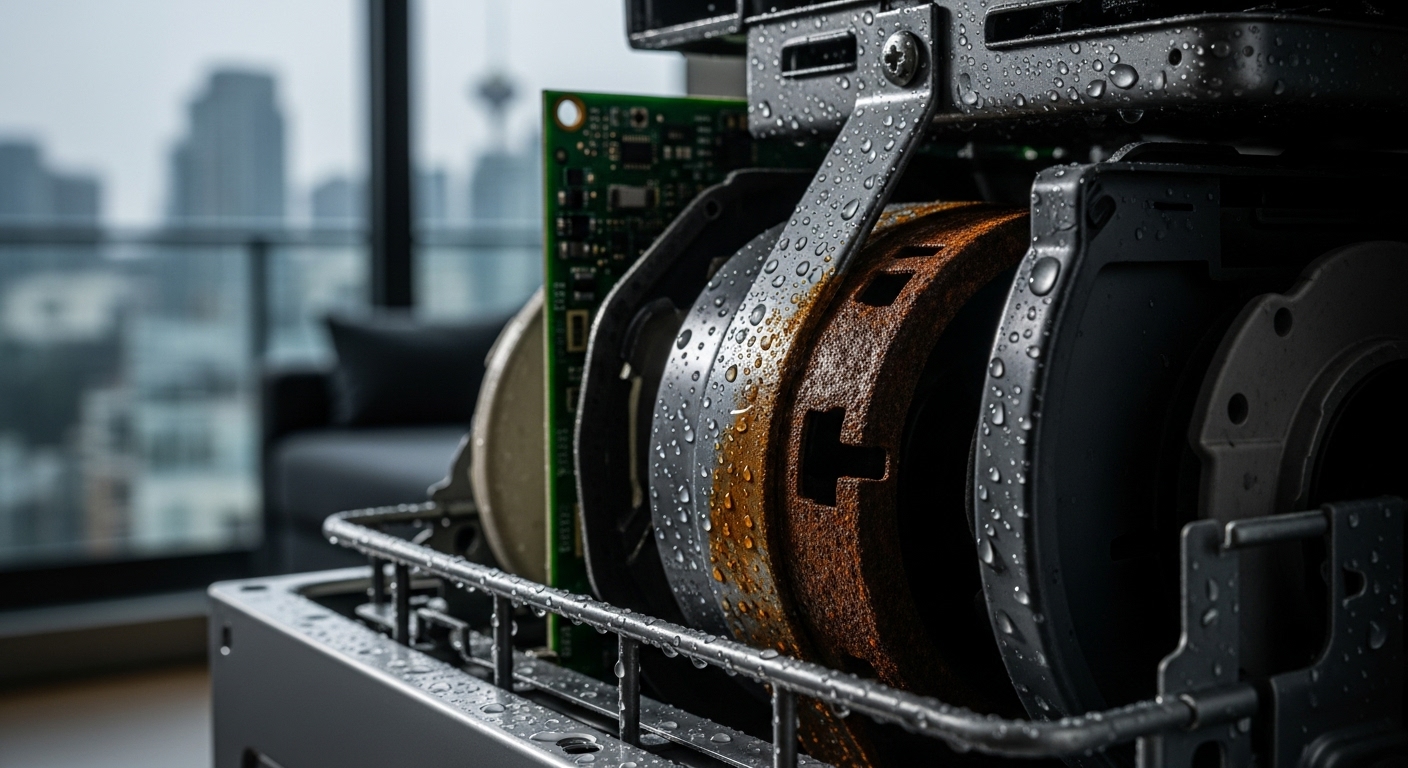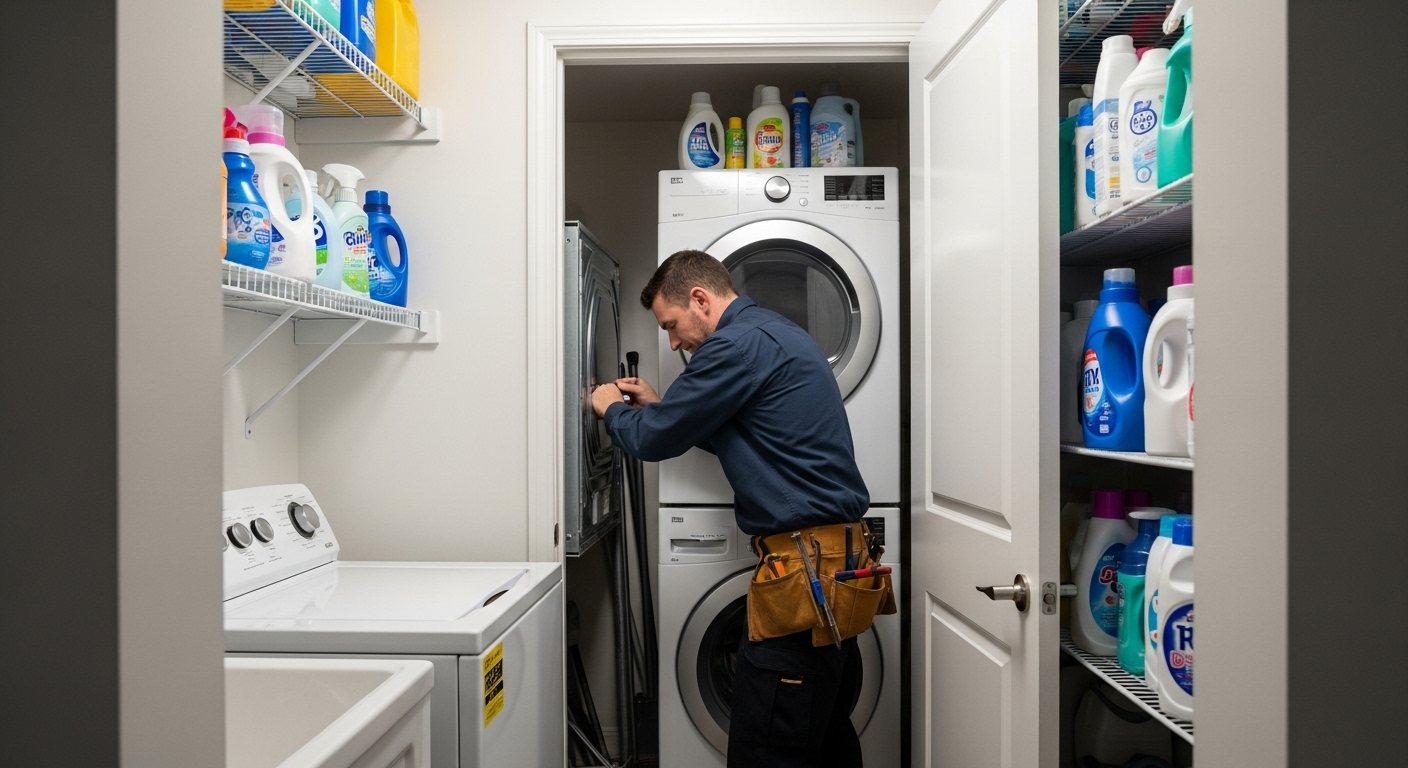Vancouver Condo Appliance Challenges: Why High-Rise Living Demands Different Maintenance (Plus Space-Saving Repair Solutions)
Struggling with appliances that seem to break down faster in your Vancouver condo than they did in your previous home? You’re not imagining things – high-rise coastal living creates a perfect storm of challenges that can slash appliance lifespan by up to 30% while demanding specialized maintenance approaches you never needed before. Living in a Vancouver condo means dealing with appliance challenges that homeowners in single-family houses rarely encounter. The combination of our coastal climate, high-rise building infrastructure, and space constraints creates a unique maintenance environment that standard appliance care advice simply doesn’t address. From salt air that corrodes internal components faster than you’d expect, to strata regulations that can complicate simple repairs, condo residents need specialized knowledge to keep their appliances running smoothly. The reality is that your dishwasher, washing machine, and other appliances are working harder in a condo environment than they would in a suburban home. Shared ventilation systems, fluctuating water pressure, and electrical load limitations all contribute to increased wear and tear. Understanding these challenges is the first step toward developing effective maintenance strategies that can extend appliance life and reduce unexpected breakdowns.
Key Outtakes:
- Vancouver’s coastal humidity reduces appliance lifespan by 20-30% compared to interior locations due to salt air corrosion and moisture damage
- High-rise buildings face unique ventilation challenges where only 8% of intended air circulation reaches individual units effectively
- Strata electrical load limitations increasingly restrict appliance installations and upgrades as buildings reach capacity limits
- Compact appliance placement requires specialized repair approaches and space-saving maintenance solutions
- Shared building systems create interdependent appliance performance issues that individual unit maintenance cannot fully address

Vancouver’s Climate Creates Unique Appliance Torture Conditions
The coastal environment that makes Vancouver such a beautiful place to live creates hidden challenges for your home appliances. Salt-laden air doesn’t just stay outside – it infiltrates your condo through ventilation systems, windows, and even small gaps around doors and fixtures. This constant exposure accelerates corrosion of metal components, electronic circuits, and internal mechanisms in ways that manufacturers don’t typically account for in their standard warranty considerations. Vancouver’s humidity levels consistently hover above optimal ranges for appliance operation, creating condensation in places where moisture was never meant to accumulate. Your refrigerator coils work overtime in this environment, while washing machine drums become breeding grounds for mold and mildew that can cause premature seal failures. The frequent temperature swings from our marine climate cause constant expansion and contraction of metal components, leading to connection problems and seal degradation that shortens overall appliance life.  Electronic components suffer particularly in Vancouver’s humid conditions. Circuit boards exposed to persistent moisture develop corrosion that creates intermittent failures – those frustrating problems where your appliance works fine one day and acts up the next. The salt content in our air acts as a conductor, accelerating electrical component failure and creating maintenance challenges that inland residents rarely face.
Electronic components suffer particularly in Vancouver’s humid conditions. Circuit boards exposed to persistent moisture develop corrosion that creates intermittent failures – those frustrating problems where your appliance works fine one day and acts up the next. The salt content in our air acts as a conductor, accelerating electrical component failure and creating maintenance challenges that inland residents rarely face.
High-Rise Infrastructure Limitations Impact Appliance Performance
Moving from Vancouver’s coastal challenges to the unique demands of high-rise living reveals another layer of complexity. High-rise buildings face significant ventilation system inefficiencies that directly impact appliance performance throughout the building. Research shows that in typical high-rise construction, only 40% of ventilation air actually makes it into common corridors, and only 20% of that reaches individual dwelling units – meaning your condo receives just 8% of the intended air circulation. This ventilation inefficiency creates a cascade of problems for your appliances. Poor air circulation means higher humidity levels in individual units, forcing your dehumidifying appliances like air conditioners and heat pumps to work harder than designed. The lack of proper air exchange also means cooking odors and moisture from dishwashers and washing machines linger longer, creating conditions that promote mold growth and component degradation. Water pressure variations between floors create another challenge that affects appliance operation. Upper floors often experience insufficient water pressure due to gravitational loss, while lower floors may have excessive pressure that can damage fixtures and internal appliance mechanisms. Your washing machine’s fill cycles, dishwasher spray arms, and ice maker operations all depend on consistent water pressure to function properly, and high-rise buildings rarely provide this consistency across all floors. Electrical load management has become an increasingly critical issue as Vancouver condos reach power capacity limits. Strata corporations now frequently require complete electrical overhauls and load calculations before approving new appliance installations. Some communities have experienced blackouts from the combined demand of heat pumps and electric vehicle charging, forcing building managers to implement strict restrictions on appliance upgrades and installations.
Space Constraints Complicate Maintenance and Repairs
The transition from infrastructure challenges to practical maintenance issues reveals how space constraints create unique problems for condo appliance care. Built-in and stacked appliances that maximize space efficiency in condo designs create significant complications for routine maintenance and emergency repairs. Many repair services charge additional fees of $125 or more for unstacking or uninstalling appliances before work can begin, as technicians need extra time and personnel to access components safely.  Compact kitchen designs that look sleek and maximize living space often position appliances in configurations that limit repair tool access. Standard service procedures that work fine in spacious suburban kitchens become elaborate multi-step processes in tight condo spaces. Refrigerators tucked into custom cabinetry, dishwashers with minimal clearance, and combination washer-dryer units all require specialized techniques and tools that not every repair service provides. Shared wall considerations add another dimension that single-family homeowners never face. Appliance vibration and noise issues in condos don’t just affect your comfort – they impact neighboring units and can violate strata noise bylaws. This means repairs often require specialized mounting solutions, sound dampening materials, and installation techniques designed to minimize transmission through building structures. Storage of repair parts and tools becomes a logistical challenge in condo living. Emergency repairs that might involve multiple trips to retrieve parts from a truck become complex coordination efforts when technicians must navigate parkade access, elevator scheduling, and building security protocols. These practical limitations often extend repair times and increase costs compared to similar work in detached homes.
Compact kitchen designs that look sleek and maximize living space often position appliances in configurations that limit repair tool access. Standard service procedures that work fine in spacious suburban kitchens become elaborate multi-step processes in tight condo spaces. Refrigerators tucked into custom cabinetry, dishwashers with minimal clearance, and combination washer-dryer units all require specialized techniques and tools that not every repair service provides. Shared wall considerations add another dimension that single-family homeowners never face. Appliance vibration and noise issues in condos don’t just affect your comfort – they impact neighboring units and can violate strata noise bylaws. This means repairs often require specialized mounting solutions, sound dampening materials, and installation techniques designed to minimize transmission through building structures. Storage of repair parts and tools becomes a logistical challenge in condo living. Emergency repairs that might involve multiple trips to retrieve parts from a truck become complex coordination efforts when technicians must navigate parkade access, elevator scheduling, and building security protocols. These practical limitations often extend repair times and increase costs compared to similar work in detached homes.
Strata Regulations Create Complex Responsibility Frameworks
Understanding the maintenance challenges leads naturally to navigating the complex responsibility frameworks that govern condo appliance ownership and repair. Strata bylaws create intricate divisions between common property and individual unit responsibilities that can leave owners uncertain about who handles specific appliance issues. Common area HVAC systems fall under strata corporation responsibility, while individual unit equipment remains homeowner responsibility, but the boundaries aren’t always clear when systems interconnect. Installation permit requirements add bureaucratic complexity that single-family homeowners don’t face. Gas appliances and major electrical installations require permits that vary dramatically between municipalities – from $150 in some Vancouver areas to over $1,000 in certain municipalities. These costs and approval processes can significantly delay necessary appliance replacements and upgrades, forcing residents to live with failing equipment longer than advisable. The insurance and liability landscape becomes particularly complex when condo appliance failures cause damage to neighboring units. Water damage from a failed washing machine or dishwasher creates insurance claims that require coordination between individual homeowner policies and strata corporation coverage. Unlike single-family home incidents where responsibility is clear-cut, condo situations often involve multiple insurance companies, deductibles, and liability determinations that can take months to resolve. Strata approval processes for appliance installations increasingly involve detailed engineering assessments and building capacity studies. Heat pump installations, high-efficiency electric appliances, and even upgraded ventilation systems may require strata council approval and professional load calculations before installation can proceed. These requirements protect building infrastructure but can significantly complicate and delay necessary appliance upgrades.
Maintenance Strategies Adapted for Condo Living
The regulatory complexities naturally lead to developing practical maintenance strategies that work within condo constraints while addressing Vancouver’s unique environmental challenges. Adapted cleaning schedules become essential when coastal humidity and limited ventilation combine to accelerate component degradation. HVAC filters require inspection every three months rather than the standard recommendations, while appliance cleaning cycles need more frequent attention to prevent mold and mineral buildup. Professional service coordination takes on added importance in condo environments where appliance failures can cascade through shared building systems. High-use appliances require annual professional servicing, but timing must align with building maintenance schedules and strata access requirements. Coordinating multiple service appointments during designated building access times can help reduce individual service call fees while ensuring comprehensive appliance care. Energy efficiency optimization becomes particularly important in condo living where phantom power loads can account for up to 10% of household energy consumption. With BC Hydro’s tiered rates starting at 11.72 cents per kWh, eliminating energy vampire appliances becomes crucial for cost management. Identifying and addressing these hidden power drains requires systematic assessment of every appliance’s standby power consumption and optimization strategies 


